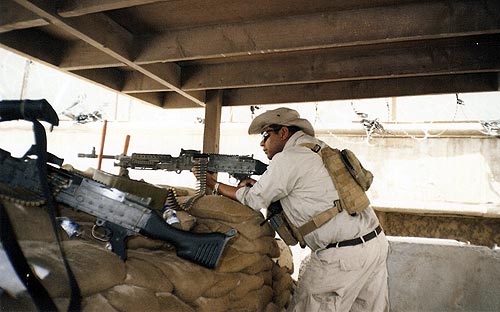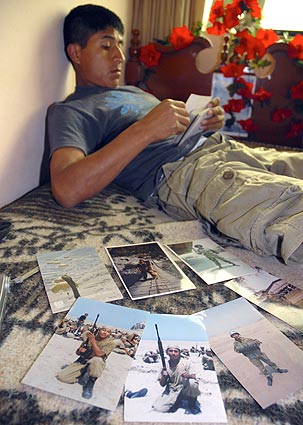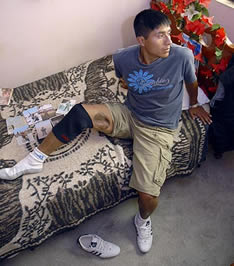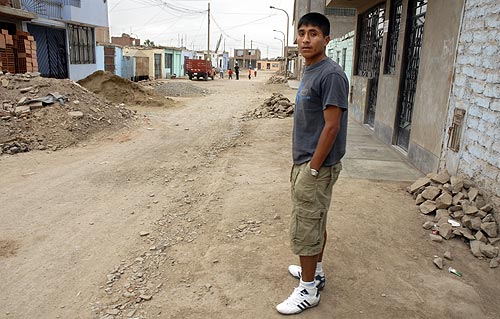PHOTO GALLERY: Latin Americans in Iraq (Click or scroll down)
Iraq contractors tap Latin America's needy
January 28, 2008 - Los Angeles Times
By Patrick J. McDonnell, Los Angeles Times Staff Writer patrick.mcdonnell@latimes.com
Thousands with limited opportunities at home are lured by pay; but for some who are injured or disabled, the cost his high.
LIMA, PERU -- Sometimes he wakes up with a shudder, thinking he needs to take cover, fast. At other moments he dreams he's running and the mortar shell strikes again, fiery shards of metal ripping through his flesh.
"I take pills to help me sleep," Gregorio Calixto says, proffering a box of cheap over-the-counter medication, the only kind he can afford.
In the United States, Calixto might be under treatment for post-traumatic stress disorder from his time in Iraq, receiving daily physical therapy and counseling. Here he's an unemployed street vendor, renting a spartan room and struggling to recover physically and emotionally from severe shrapnel wounds.
He is one of several thousand Latin Americans who have taken jobs with U.S. contractors as security guards in Iraq and Afghanistan. About 1,200 Peruvians are in Iraq, mostly guarding sites in Baghdad's Green Zone. Chileans, Colombians, Salvadorans and Hondurans have also served as part of the polyglot assemblage providing "conflict labor" in U.S. war zones.
Although most appear to have returned to Latin America safely and with enough cash to buy houses, taxis and businesses, others, such as Calixto, have been unlucky: seriously injured in Iraq and left to negotiate a labyrinthine and what he terms inadequate U.S. insurance system.
The primary recruiter here, Triple Canopy, a Virginia-based firm founded by U.S. Special Forces and Delta Force veterans, defends its practices. Peruvians are treated no differently from U.S. employees, the company says, and 85% sign up for extensions.
"We believe that Triple Canopy has developed a fairly sophisticated model for managing third-country national security guard forces," Mark DeWitt, the company's senior director of government affairs, said in a statement.
The Latin American recruits are mostly former soldiers and police officers, many with experience fighting leftist rebels.
"They know that we come from a military tradition, that we are disciplined," says Norman Solano, 46, a strapping veteran of Peru's 1980s campaign against Maoist guerrillas who spent more than a year as a security guard in Iraq.
The Peruvians aren't among the $500-plus-a-day hotshots who escort U.S. and allied convoys, such as the Blackwater USA guards facing accusations of shooting first and asking questions later. Those top-end guns-for-hire typically come from the U.S. or Britain.
Rather, the Peruvians and others from developing nations are rent-a-cops, staffing checkpoints and guard towers and keeping alert. Many never fire their weapons.
Triple Canopy says no foreign national working for the firm has been killed in Iraq but declined to provide data on Latin Americans injured there. Two company officials who asked not to be named, however, said about a dozen Peruvian guards had been injured by "indirect fire" (mortar shells or rockets). The worst injury, the officials said, was suffered by a Peruvian who lost an eye. The noncombat casualties included one man who died of a heart attack and another who succumbed to leukemia shortly after being sent home.
For Latin American recruits, the pay is the major lure.
The Peruvian employees typically earn about $1,000 a month; $900 is wired to personal bank accounts, while $100 "spending money" is parceled out in Iraq. All expenses, including room and board and travel, are paid. They work six-day shifts.
It's a hard-to-match deal for ex-soldiers and cops with little education. Some returnees even describe the postings nostalgically as a kind of dream job, despite the dangers, bouts of boredom, time away from family and scorching summers.
"I just wish I could go back," says Solano, who, like Calixto, served from 2005 to 2007 as part of a detail of Peruvians protecting the U.S. mission in the southern city of Basra. "I never ate so much. We had salmon, meat, rice, every day! And dessert! Some of us got fat. We had to work out in the gym to keep the weight off."
Since returning to Peru more than a year ago, Solano has struggled to find steady work. He said his request to return to Iraq has been rejected because of a "stress" condition he developed there, resulting in shortness of breath.
"I'd rather die in a war than die of hunger in my own country," Solano says, taking a break from his current job guarding an outdoor municipal pump from thieves in the northern harbor city of Chimbote, a town reeking with the pungent aroma of fish-meal processing plants.
"Iraq was a good time for me," says Solano, a father of twowho now earns about $200 a month, though he hasn't been paid in two months.
Calixto, 27, a former sergeant in Peru's army and the seventh of 11 children, was selling cigarettes and sweets from a pushcart when he heard from a relative that a U.S. firm was seeking recruits for Iraq. He applied at the downtown office of a Triple Canopy subcontractor and was hired the next day, signing a one-year contract.
"I figured I'd be able save some money to study when I came back," says the soft-voiced Calixto, who would like to learn English and become an accountant someday.
He completed his year's contract in November 2006 and says he gladly accepted a four-month extension, at a significant raise -- $1,600 a month.
His luck ran out Jan. 7, 2007. The familiar screech of incoming sent everyone scrambling.
"We were running for cover, and I heard the mortar round as it passed by," Calixto recalls. "Then there was a very loud explosion. I began to scream. I looked at my leg and there was a lot of blood. I could see the bone. But I never passed out. . . . That was something that really impressed my supervisors."
Shrapnel had made a deep gouge on the inside of his right thigh. Calixto would spend a month in U.S. and British hospitals in Iraq, receiving a skin graft before being sent home on crutches last February. His left eardrum was also damaged; he uses a hearing aid.
Calixto says he has no complaints about his treatment in Iraq. The problem, he says, has been getting help since his return to Peru. The U.S. Defense Base Act requires that contractors such as Triple Canopy provide coverage, including disability, for work-related injuries. Claims, however, are reviewed by the U.S. Labor Department and are administered by a U.S. insurance company.
Calixto describes a frustrating process of telephoning representatives in the United States and finding no one who speaks Spanish; of frequent trips to downtown Lima, the capital, to speak with representatives of Triple Canopy; pleading for reimbursement for clinic bills, medicine, taxis, international phone calls and other expenses. He only irregularly attends physical therapy sessions, he says, because of delays in getting reimbursed.
He lives on $492 in monthly disability checks provided through the Triple Canopy insurance. But he says he doesn't know how long that's going to last. Nor does he consider it sufficient: The injury has severely limited his prospects in a country where the maimed can often be found begging in the streets. He also says he is owed two months' back pay.
Triple Canopy declined to comment on individual cases but acknowledged "past delays" in its insurance plan. The company says it is working to smooth out the system. Last year, Triple Canopy switched from a subcontractor to a wholly owned subsidiary here, it says, "to improve service for our Peruvian personnel."
Still, Calixto says he has no regrets about going to Iraq. During his time away, he saved $12,000, enough to buy a ramshackle adobe home a few blocks from the stifling room he still rents for $40 a month.
"I need to fix it up, but it's a start," says a limping Calixto.
He bids goodbye, sitting alone on a dusty cot in his roofless dream house, remembering a distant war no one here much thinks about.
Special correspondent Adriana León in Lima and Andrés D'Alessandro of The Times' Buenos Aires Bureau contributed to this report. Bureau chief McDonnell was recently on assignment in Peru.
| (right) Norman Solano, shown in Basra, Iraq, in 2006, is one of thousands of Latin Americans who have taken jobs with U.S. contractors as security guards in Iraq and Afghanistan. Solano served from 2005 to 2007. Courtesy Norman Solano |  |
| (right) Solano and his fellow Peruvian guards are shown in Basra in 2006. Most of the Latin American recruits are former soldiers and police officers, many with experience fighting leftist rebels. “They know that we come from a military tradition, that we are disciplined,” Solano says. (Courtesy of Norman Solano) |  |
(left photo) Solano, now back in Chimbote, Peru, struggles to make a living as a private guard. He would like to go back to Iraq, but said his request was rejected because of a "stress" condition he developed there. (Courtesy of La Republica) (right photo) Gregorio Calixto, a Peruvian who was seriously injured while guarding a U.S. installation in Basra, says it's been a struggle to find work in Lima and feels that he deserves more disability pay and medical treatment than he is getting. (Flor Ruiz / For The Times) |
  |
| (right) Calixto, 27, spent a month in U.S. and British hospitals in Iraq recovering from the shrapnel wound to his thigh. He uses a hearing aide after his left eardrum was punctured during the mortar shell attack. Although he has no complaints about his treatment in Iraq, he says it's been hard getting help back in Peru. (Flor Ruiz / For The Times) |  |
| (right) Calixto is shown on the streets of his working-class neighborhood in the outskirts of Lima, Peru. The former army sergeant says he has no regrets about going to Iraq and would like to learn English and become an accountant one day. (Flor Ruiz / For The Times) |  |